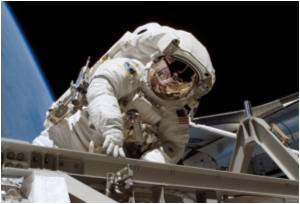Novel drug protects memory function in mice exposed to simulated cosmic radiation.

‘Rebooting the brain's microglia can protect cognitive function following radiation exposure, and it is not necessary to treat immediately following the radiation exposure for the drug to be effective.’





Humans venturing beyond the Earth's protective magnetic fields will be exposed to levels of cosmic radiation estimated to be 1000 times higher than what we experience on Earth or even in the International Space Station's low-earth orbit. Protecting astronauts from this harmful radiation will be key to making deep space exploration--and perhaps one day colonization--possible. Rosi, who is Director of Neurocognitive Research in the UCSF Brain and Spinal Injury Center and a professor in the departments of Physical Therapy and Rehabilitation Science and of Neurological Surgery, has conducted NASA-funded research for the past four years to understand how deep space radiation may affect astronauts' brains.
Rosi's team has previously found that exposing mice to simulated space radiation causes problems with memory, social interactions, and anxiety, and has linked these symptoms of radiation exposure to activation of cells called microglia--part of the brain's immune system. Activated microglia drive brain inflammation similar to what is seen in neurodegenerative disorders such as Alzheimer's disease, and also seek out and consume synapses, the information-bearing connections between brain cells.
"We are starting to have evidence that exposure to deep space radiation might affect brain function over the long term, but as far as I know, no one had explored any possible countermeasures that might protect astronauts' brains against this level of radiation exposure," said Rosi, who is a member of the Weill Institute for Neuroscience, the Kavli Institute of Fundamental Neuroscience, and the UCSF Helen Diller Family Comprehensive Cancer Center.
In the new study, the researchers collaborated with co-authors at Loma Linda University in Southern California to expose mice for a day to a dose of radiation comparable to what they might experience in deep space. The experiments were conducted at the NASA Space Radiation Laboratory at Brookhaven National Laboratory in New York, the only facility in the country where such experiments are possible. A week later, after being shipped back to UCSF, some of the mice were treated for 15 days with PLX5622, a drug produced by Berkeley-based pharmaceutical company Plexxikon, Inc, and which the Rosi lab had previously shown to prevent cognitive deficits in a mouse model of cancer radiation therapy when administered prior to irradiation of the brain.
Advertisement
Remarkably, animals that had been treated with PLX5622 soon after being exposed to radiation performed just like healthy mice on the memory task. The researchers examined the animals' brains and showed that while the brains of untreated mice were full of activated microglia and had lost significant numbers of synapses, the brains of treated mice looked just like normal. The authors hypothesize that by forcing the brain to replace irritable, radiation-exposed microglia with new, healthy microglia, the drug had allowed the animals avoid the cognitive consequences of radiation.
Advertisement
Similar compounds to PLX5622 produced by Plexxikon (inhibitors of a cellular receptor molecule called CSF1R) are already in clinical trials for multiple forms of human cancer, which suggests that the new findings could soon be translated to human use, the researchers say. Beyond spaceflight, these compounds could potentially be used to prevent cognitive impairments following cancer radiation therapy, or in age-related cognitive impairment--which has also been linked to microglia-driven brain inflammation.
"NASA is very interested in finding ways of ensuring both astronaut safety and mission success during deep space travel," said study co-lead author Karen Krukowski, PhD, a postdoctoral researcher in Rosi's lab. "But astronauts are a small population--it's exciting that these findings could potentially help prevent many other forms of cognitive impairment."
Source-Eurekalert











